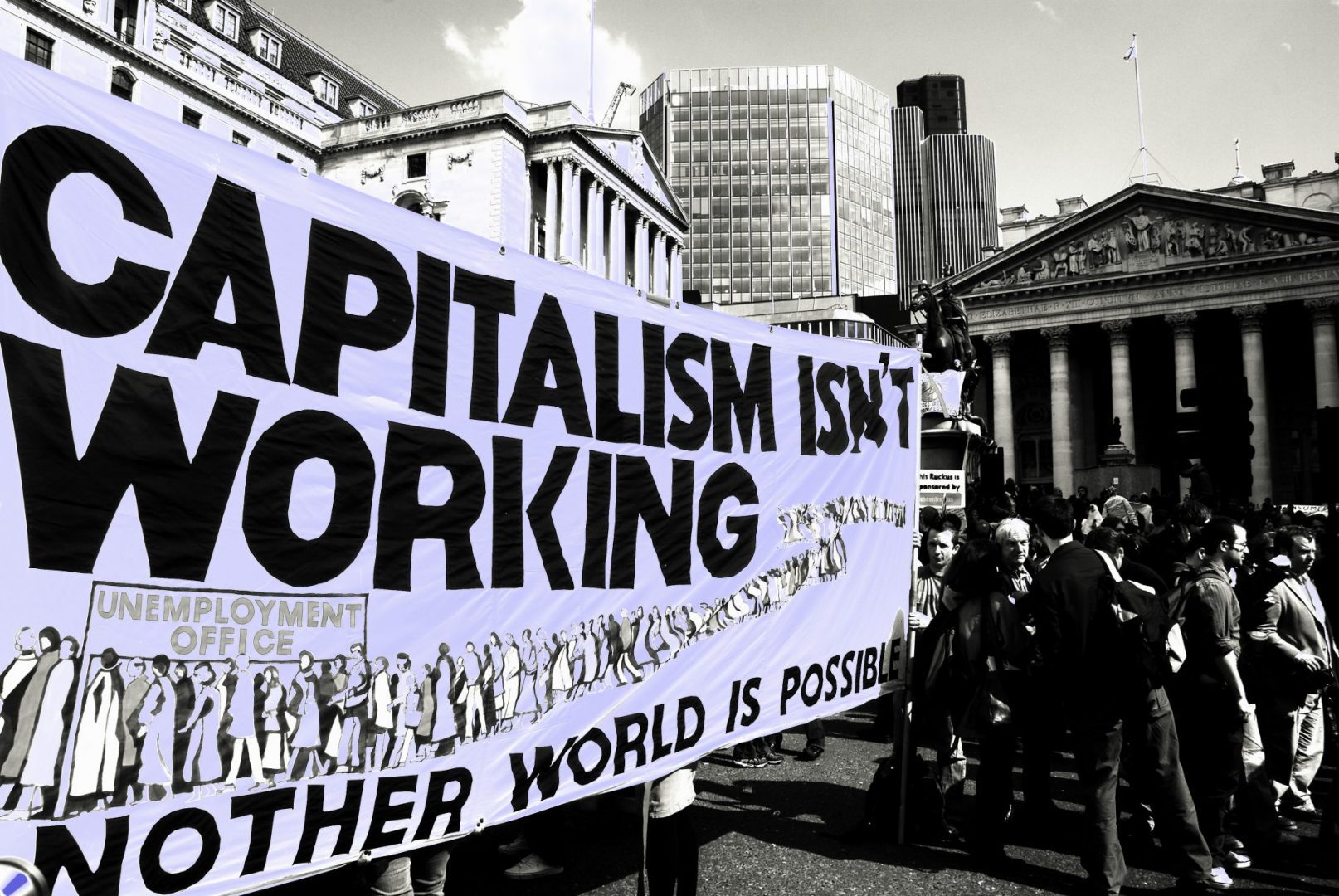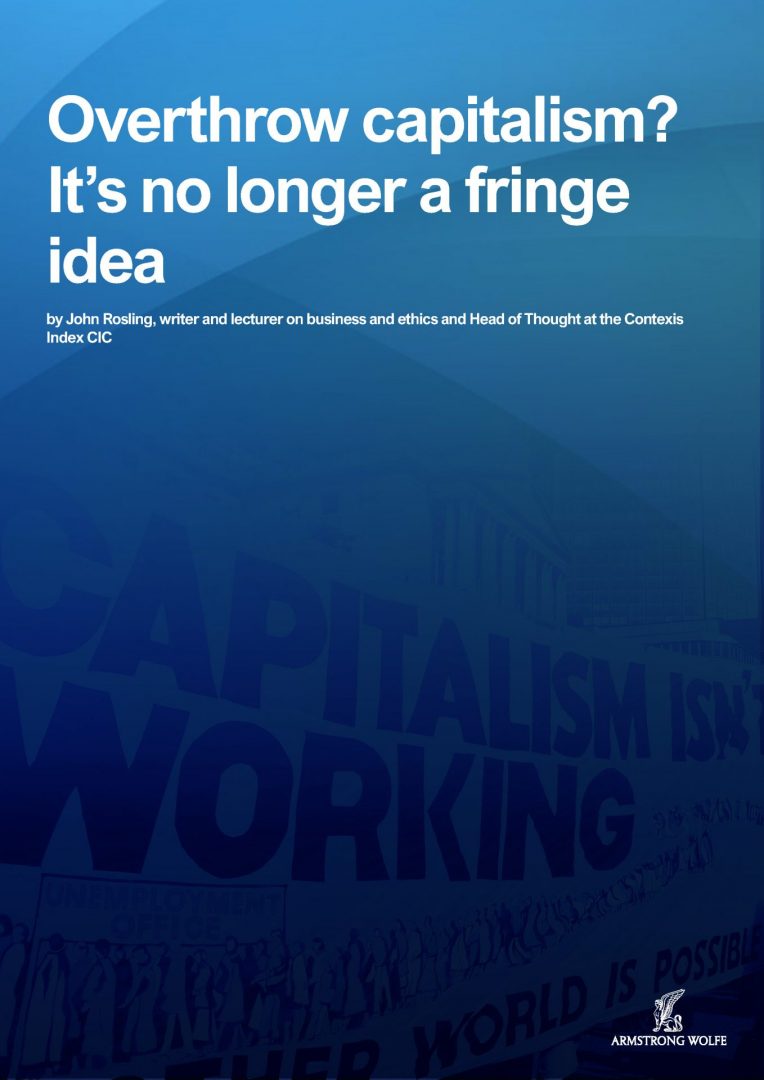
Revolution is in the air. But capitalism’s greatest gifts are yet to come. If ESG becomes more than words and gestures. The evidence is clear that purposeful companies are better companies. But only under certain very specific conditions.
A rigged game?
In his seminal 2020 book “Grow the Pie” the economist Prof. Alex Edmans highlights the crisis facing capitalism. “In the eyes of millions of citizens” he concludes “it’s a rigged game. Corporations exist to line the pockets of executives and investors, paying scant attention to worker wages, customer welfare or climate change. … That’s why we have a crisis. Many believe it is inherently broken. They argue we need a new system, and so there are serious proposals to overthrow capitalism as we know it by breaking up or nationalizing large companies, regulating executive pay and share buybacks, and wresting the control of businesses away from shareholders.1”
The crisis is, of course, real. From the climate emergency to social disintegration. But Edmans concludes hasty reforms are not the answer. “Such reforms” he writes “risk stifling the many positive contributions that enterprises make to society. What we need is a solution that works for, and involves, both business and society”.
A new model for capitalism?
The Financial Times appears to agree, highlighting the emergence of “a new model for capitalism based on the watchwords of purpose, inclusion and sustainability” concluding that “a new worldview, shared by leading executives and investors and shaped by an unlikely alliance of consumers, employees, campaigners, academics and regulators. could break a consensus that has governed business for two generations. 2”
And increasingly this idea is finding its way into regulation. In the UK, the Financial Reporting Council (soon to become the Audit, Reporting and Governance Authority with new enforcement powers) requires all Boards to “establish the company’s purpose, values and strategy, and satisfy itself that these and its culture are aligned”.
Even Blackrock’s Larry Fink has suggested that “to prosper over time, every company must not only deliver financial performance, but also show how it makes a positive contribution to society” because “purpose is not the sole pursuit of profits but the animating force for achieving them.”
These are important words. The world’s biggest asset manager is making quite an assertion; that this new model of purpose before profit is not just a social responsibility on business, nor a matter of reputational protection (although both of those are both morally and strategically true) but that it is actually the source of sustained value growth.
But where is the evidence?
But what is the evidence for this? Where are the numbers that show that a focus on purpose and not profit will truly allow organisations to “prosper”? And how exactly can this possibly work?
It was to answer these questions that a group of entrepreneurs and academics came together to create the Contexis Index®, a methodology that accurately measures the impact of purpose on the performance of organisations in real time, based on robust academic research from the leading behavioural scientists in their fields from around the world.
This approach single-mindedly focusses on the attitudes and behaviours of the human beings in the business – and not on the externalities that are often measured as proxies for purpose – in the belief that the behaviours triggered by the organisation’s purpose is the most accurate way to assess whether that purpose is real, and to understand its impact on the consequent performance of the business.
Organisations in 26 countries have now adopted the measurement methodology in order to understand, for their own businesses, whether the purpose they have invested time and treasure in adopting is making any material difference to performance, and if so, how this is working and where it is blocked. Anonymised data from these companies has been analysed at Cambridge with remarkable results.
Dramatically higher levels of human performance
In every organisation studied, in every country assessed, an activated purpose drives higher levels of human performance. And dramatically so. What is more, this impact is not restricted to predictable attitudes such as engagement but also commitment, care for the organisation, openness to ideas, innovation, clarity and velocity of decision-making. In fact, every attitude and behaviour that has been shown in 50 years of organisational research to enhance business performance appears to be improved by purpose. And to an unexpected degree.
So much so, that the relationship between an activated purpose and organisational performance is clear and linear. The more an organisation can embed its purpose in its culture, the better its people perform. The same impact can be observed over time; organisations that focus on purpose see a direct improvement in performance behaviours.
As an example, a European Bank found that employees who believed the organisation to be purposeful exhibited levels of trust in the Bank 3x more strongly than peers who did not, showed commitment and responsibility for the organisation twice as strongly and were half as likely to quit. The problem was that only 22% of employees believed in the Bank’s purpose. The Bank took action, focussing on bringing purpose to life across the team. After only 6 months the Bank measured a 40% increase in trust and a 25% increase in commitment and ownership across the organisation as a result of bringing purpose to life.
And what of a commercial outcome? In comparing its teams that had engaged in the purpose activation program against those that had not, the Bank found a 13% increase in revenue. In another example, a global media company ranked its international offices in terms of growth and profitability and found the ranking almost exactly matched the purpose activation score on the Index. Whilst this research is at too early a stage to confidently demonstrate causality, the inference is clear. Purpose drives human happiness and organisational performance. And performance leads to a commercial return.
Simply having a purpose makes no difference to performance
But there is a problem. Almost every organisation ‘has a purpose’. And most spend significant amounts of money and energy in communicating it. So why is it that some organisations, and some parts of organisations, see the positive impacts of purpose. And most do not?
The research shows that awareness of purpose has zero impact on human and organisational performance. People can be very clear about the purpose the organisation claims to serve but this knowledge does not make them feel or behave any differently. The stand-out conclusion is that it is not about having a purpose but about activating it in the culture of the organisation that creates the startling performance gains shown in purposeful organisations.
If purpose drives performance, what drives purpose?
And even more importantly it shows exactly how purpose works in each organisation. And what is blocking it. These insights allow organisations to tailor programmes, like the Bank, to unleash the latent power of purpose.
Activation is created by the presence of a combination of highly specific cultural attributes. And these seem common across organisations and countries.
Firstly, organisations must make purpose the ‘north star’, the context for decision-making and behaviour. And this must be consistent over time and across the business. Purpose is not an add-on but core to why the organisation exists. Patagonia is ‘in business to save our home planet’. It’s been saying that for years. And more importantly acting on it.
Secondly, they must build an environment of trust. If people don’t trust the organisation and its intentions, they cannot act on that purpose. Trust starts with the consistency of purpose. But it deepens through the openness, transparency and vulnerability of leadership and the experienced compassion and care of culture. Trust allows people to act for the good of the company – and not to protect their own position. Because they do not fear sanction and blame. And that leads to openness and innovation. In all the companies measured, a massive difference in trust is one of the key differentiators between a company where purpose is truly alive, against one where it is simply stated. Rebuilding trust was one of the keys to activating purpose in the European Bank described above.
And thirdly, and as a direct result of a clear purpose and radical trust, these companies exhibit a culture of ownership and responsibility. People, at every level, care enough to act because it is theirs. Emotional ownership has a direct impact on both engagement (do I care?) and autonomy (enough to do something about it myself). By focusing on the unique interplay of these three key attributes of context, trust and ownership in each part of the organisation, any organisation can use insights from the analysis to tailor intervention to unlock purpose.
As Alex Edmans concludes “Once a purpose has been decided upon, it must go beyond a statement and live in the enterprise.”
Activated purpose in action
A great example of this is presented by Southwest Airlines. The airline’s purpose is to ‘connect people to what’s important in their lives’. Its vision is to be the world’s most loved and most profitable airline. So, what happens when ‘loved’ collides with ‘profitable’. How are a thousand decisions across a $26bn corporation made. And who makes them?
When his grandson fell into a coma and was close to death, Mark Dickinson found out. He was on a business trip in LA and raced to get to his grandson’s bedside. Delays and unsympathetic officialdom meant Dickinson arrived at his gate 12 minutes late for his flight. Southwest is notorious for turning its planes faster than its competitors, in pursuit of its vision to be the most profitable airline. It is never late. 12 minutes is an eternity. Yet, the pilot was standing at the gangway, waiting. He knew there would be a significant cost to the airline for this act of kindness, and that it was in direct contradiction to its driving commercial vision. But he also knew choices at Southwest are driven by purpose. And that everyone has the autonomy to make them in a culture of trust.
So, the answer to the question is that decisions are made in reference to its purpose. And by each of the 56,000 employees. Because they own the company’s purpose.
What can we learn from this? That an activated purpose clarifies decision-making. That employees are empowered to do the right thing for the company when given the ownership to act with autonomy within an environment of trust. It’s no accident that Southwest is consistently in the top spot for customer experience amongst all US carriers. And is one of the most profitable.
It’s also instructive to contrast the activated purpose at Southwest with that at United. Instructive because both airlines claim almost identical statements of purpose. The difference is that Southwest purpose is the ‘north star’, whereas at United it is no more than what Forbes has called ‘a vapid promise’. The consequence is that purpose does not drive decision-making or empower behaviour – as Dr David Dao discovered when United staff dragged him from a plane to improve the efficiency of staff rotations. For United a PR disaster, yes. But also, a demonstration of how meaningless purpose is unless applied and activated. And how damaging this can be to decision-making culture and to staff and customer engagement.
We may, indeed, be at the start of a new model of capitalism. One that better serves people, society and planet. It may even be a boon for shareholders. But only if we get it right. And the evidence is clear. Purpose as a set of words is a waste of time. Purpose must exist within a highly specific cultural framework. When it does that it can be transformational to both human happiness and sustained business performance.



John Rosling
Writer and lecturer on business and ethics and Head of Thought at the Contexis Index CIC
1 Edman, Alex. ‘Grow the Pie” Cambridge University Press
2 Financial Times. ‘Beyond the bottom line: should business put purpose before profit? ‘Jan 2019
